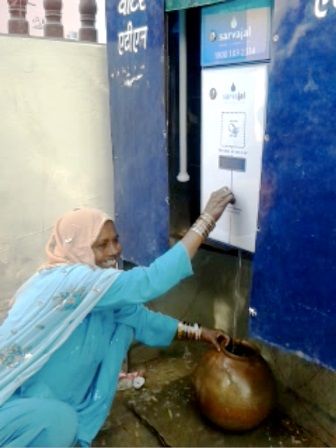Making clean water a right and reality for all - Sarvajal
When an Indian village scene is portrayed in movies, a very common shot captured is that of women and girls walking to wells to fetch water. The first shot showing a chaotic slum has very often been of women fighting over their turn to fill water from a rusting tap. These clichéd shots definitely show a lack of water availability. Much as scarcity of water is alarming, consumption of impure water poses a plethora of serious health issues. Basic necessity for a healthy life – pure drinking water is sadly a luxury to the ones who can afford it.
Sarvajal is a social enterprise on the mission to provide clean drinking water to all. It is trying to make the access to drinking water a right of every individual rather than a luxury to the few. There is no lack of water purification technology. But of these solutions are are not available to all and are expensive. This affects the rural, sub-urban and slum areas. In an Indian context, this means that 700 million Indians do not have access to clean water and 60% of the diseases in adults and 85% in children are caused due to contaminated water.
Sarvajal started in 2008 as an initiative of Grassroots Development Laboratory under the umbrella of Piramal Founation. The pilot project that started in Rajasthan for the prevention of water borne diseases caused due to impure water, has more than 150 franchises today in 6 states of India, which serve clean water at a minimal cost of 25 paisa per litre.

Anuj Sharma, COO of Sarvajal, says, “We believe that providing safe drinking water is the single most effective way to preventive health care.” While starting up, the prejudices of the market did not help the team. The perception was that treating different variety of raw water with one machine is impossible and that nobody will pay for water. The lack of awareness about the adverse effects of impure water on health in the rural areas made things even difficult.
Anuj says, “All the hypothesis are proven wrong and Sarvajal has got a huge market. People are willing to pay, local entrepreneurs are coming forward to take franchises and banks are ready to finance these entrepreneurs.” With 60% of the revenue share going to the franchise owner, incentives for supplying to more households, affordable clean water availability for all and the reduction in number of water borne diseases being seen, it is a win-win model for all.
Sarvajal manufactures filtration units, solar powered and cloud managed water ATMs, cloud based monitoring system for quality management and also customized ERPs to manage large water franchises. Some franchises operate out of a store with larger filtration units while others manage water ATMs like water dispensers. Customers can pay using their pre-paid cards (or in cash), which they can recharge just like mobile phones.

The water filtration units use reverse osmosis and ultraviolet rays to clean the water of all the impurities and are equipped with real time monitors to alert the company of their status. If a filtration unit begins has some operational problem and water quality is dropping, Sarvajal team is notified by the unit and the company takes care of maintenance. This is a USP for Sarvajal as many government projects and other vendors just sell the equipment and nobody knows of their state after a few months.
The sustainable technology and business model which Sarvajal has built in the last 5 years has come from trying out different ideas many times. Speaking of his experience in the social sector, Anuj says, “The variety of issues is so huge in the social space, that you need at least 5 – 10 pilot projects before people come on board. Thinking that I will just start one thing, stick to it and solve the problems does not happen. By very nature of a social enterprise, low cost and high quality solutions are needed and it will need trying out different concepts.”






